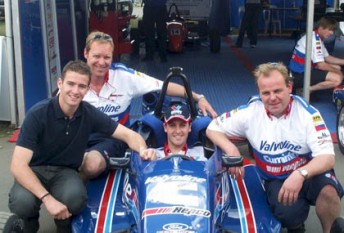

If Formula Ford is considered the breeding ground of future champions, Mick Ritter must surely be the trainer.
The man at the top of Sonic Motor Racing Services, Ritter has worked with a long list of drivers who’ve gone on to become household names in Australian motorsport.
He played an integral role in the development of drivers like Will Davison, Jamie Whincup, David Reynolds, Nick Percat, and Anton De Pasquale, and even had a cameo in Mark Webber’s formative career.
For Ritter, helping mould the next generation of motorsport heroes is a passion, an aspect of his business he has deliberately worked on and nurtured since founding Sonic back in 2002.
His story, however, begins in his youth when he was exposed to the sport through his father and then his own karting career.
“When we were kids growing up, dad was still racing, touring car championship with a sports sedan, Bathurst, those sorts of things,” Ritter told Speedcafe.com.
“From a very, very early age, we were exposed to it and that’s what drove the passion, no question.”
However, while his interest in the sport and desire to compete was clear cut, the path he took to turn it into a career was more complicated.
Ritter began karting well before his 10th birthday, and took it “super seriously” until his late teens.
Such was his drive that in 1993 he headed to the UK in an effort to forge a career as a driver, but once there his life found a different track to follow.
“I started to get involved in helping some guys with Formula Fords here in the late ’80s,” Ritter recounted.
“Bobby Smith sort of had me come along and I guess I pestered him and Russel Ingall to come along and help them.
“I did that as a part-time thing, just going to race meetings and going to test days, helping out where I can, from sort of ’89, ’90 with Russell, and then with John Blanchard, Tim’s father, in the early ‘90s.
“I was sort of still dovetailing that around a bit of go-kart racing and working with my father in his kart shop.”
His intention was to be as close to the sport as he could be in an effort to learn, with a view to competing in Formula Ford himself.
“We weren’t in a financial position, the family at that time,” he explained.
“That’s where, I guess, I made the decision to move to the UK in late ’92. I wasn’t particularly going to a job.
“I had a friend of mine by the name of Russell Atkinson, who was already over there working.
“He was worked for the Van Diemen team at the time, and he sort of just basically said, ‘Pack your bags, get over here. Go and see these guys, and I reckon you’ll get a job’.
“So I sort of went over there without a job as such but within 24 hours of landing there, got a job.
“From that point on, that’s where my career as a mechanic really started to evolve.”
Ritter started off in the production shop at Swift, assembling new cars for customers for different markets around the world.
His tenure there was short as he was soon preparing cars for prospective customers before moving into the race team proper, staying in that role for 1993 and 1994 before joining Van Diemen.
“My role there started to become more a mechanic and engineer, if you want to call it that,” Ritter explained.
“Whereas at Swift I was sort of being directed by an engineer, at Van Diemen, you were more in control of your own car from both a mechanical and engineering perspective.
“So ’95 was probably a big, big learning year for me in that sense.”
Late in 1995, Ritter worked with a young Mark Webber, running a test day for him at Snetterton ahead of the Formula Ford Festival.
“I didn’t know Mark at all; he’d started Formula Ford in this country (Australia), after I’d already moved on to the UK,” Ritter recalled.
“His speed on the day compared to our works drivers; he was right on the pace.
“I think the memorable thing is the brashness of confidence of this young bloke come from Australia.”
Ritter’s time in the UK was ultimately cut short and he was forced to return home due to some “work permit issues”.
Once back in Australia he set to work with Dougal McDougall as Mygale got off the ground.
“They wanted someone to effectively come and look after that for them. So they eventually enticed me to come and work for them and sort of take over looking after their team from ’96.”
It was Ritter’s relationship with Les Small that was to play a key part in the next chapter of his life, when Richard Davison was looking for someone to run his sons in Formula Ford.
“(Richard) knew Les Small through go-karting, and that sort of first came about where Les contacted me to tell me that Richard was looking to go Formula Ford racing with his boys, and wanted someone to look after them.
“I met with Richard and pretty quickly we struck up a relationship and a deal where I effectively started to look after Alex, and it built from there.
“The Davison family were a huge, huge part in us being able to go on and do what we’ve done, no question.”
It was from that meeting that Sonic Motor Racing Services was born, though at that early stage there was no indication of the behemoth it would ultimately become.
Business trucked along, with Ritter preparing cars initially for Alex and then Will, with whom he won the Australian Formula Ford Championship in 2001.
That season, to Ritter, is the highlight of a career which has netted a multitude of race and championship wins.
“Of course that’s one that stands out,” he admitted.
“After that we obviously won, I didn’t even know what the number is, of Australian championships in various categories since then.
“Every one of them is just as satisfying and just as rewarding as the first, but of course that first one does stand out.”
Shortly after, Ritter’s role changed, moving off the tools and into a team manager role.
“From around, 2003/2004, at that point where we were growing and running more cars, I was largely then off the tools day-to-day,” he explained.
“(I was) Still looking after set-ups and building dampers, and doing all that sort of engineering or technical part of it, but the day-to-day spanner work on the cars, was pretty well coming to an end at that point.”
Over the last two decades he’s established himself as one of the pre-eminent driver developers in Australian motorsport; a renowned hard task master capable of extracting the best from a prospective youngster.
“It’s very hard to sort of put your finger on exactly what it is, but it’s certainly something that I enjoy,” he said.
“I enjoy working with talented, young drivers and helping them go on to achieve what they’re capable of, and maximising their abilities. It’s hugely rewarding.
“You’ve absolutely got to have the talent, there’s no two ways about that,” he continued.
“There are many guys that have got the talent, but for various reasons they’re not able to go on and fulfil that; whether or not that’s a work ethic or determination issue, or it’s a financial issue.
“These days it’s certainly different and it’s much easier to help drivers improve their craft and get them up to speed with the amount of data and things like that they have access to.
“But in terms of perhaps taking someone that’s only got, if you call it 50 or 60 percent of the ability that’s required, and get them on the level of a Jamie Whincup, for example, it simply won’t happen.”
Despite having turned it into a successful career, motorsport remains a passion for Ritter.
Away from the business of running his successful racing team, which has expanded to include entries in Porsche Carrera Cup Australia and Sprint Challenge, not to mention a foray into the Super2 Series, he’s back on the tools.
“It’s certainly not the financial reward,” he joked when asked what keeps him going.
“It’s a passion. It’s been with me since I was very young and that remains the case.
“I just really, really enjoy working and achieving success with drivers,” he added.
“It’s ultimately rewarding, and to see them go on and achieve what they’ve done – and that continues to be the case with different drivers that are continuing to come through our system – I really can’t put in words how satisfying that is.
“With the lack of racing that we’ve had to do with in the last three months, we’re doing a restoration on Will and Jamie’s Van Diemen 01, so the car that Will won the championship in,” he added.
“It was something that I guess I always wanted to do myself, but it’s something I’ve been doing myself, and to be honest, I’m getting a lot of enjoyment from that.
“You forget little bits and, you know, cars that actually mean a lot to you.
“It takes you back somewhat, maybe makes you feel young a little bit again, even.”





















Discussion about this post